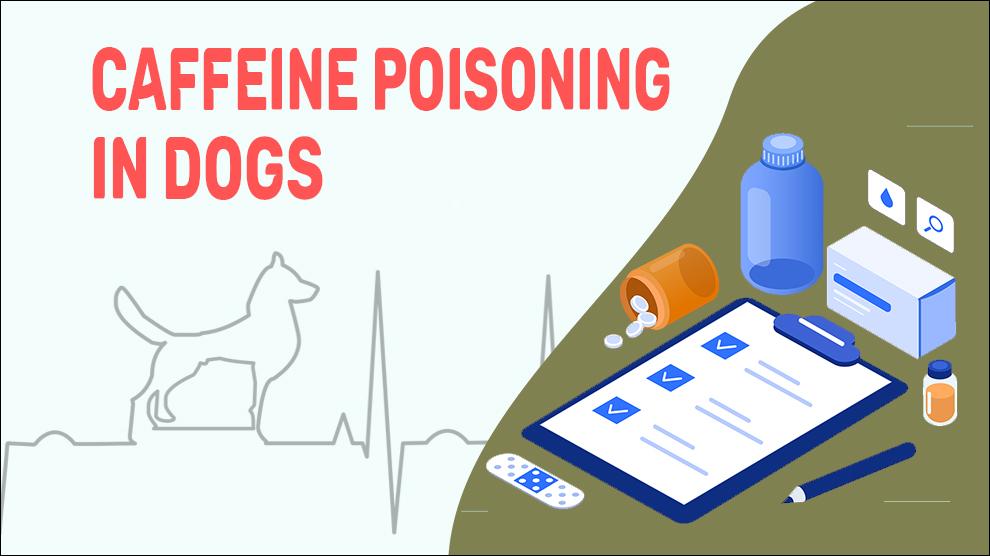What Is Caffeine Poisoning In Dogs?
Caffeine poisoning in dogs occurs when a dog consumes caffeine, which can be found in coffee, tea, chocolate, and some energy drinks.
Symptoms of caffeine poisoning can include restlessness, vomiting, rapid heart rate, tremors, seizures, and even death. It is important to seek veterinary care immediately if you suspect your dog has ingested caffeine.
Treatment for caffeine poisoning may include inducing vomiting, administering activated charcoal to absorb the caffeine, and providing supportive care such as IV fluids and medications to control seizures or heart rate.
To prevent caffeine poisoning in dogs, it is important to keep caffeine-containing items out of reach and to never intentionally give caffeine to your dog.
Symptoms Of Caffeine Poisoning In Dogs
The symptoms of caffeine poisoning in dogs can vary depending on the amount of caffeine consumed and the size of the dog.
Common symptoms include:
- Restlessness and agitation
- Rapid heart rate
- Muscle tremors or seizures
- Vomiting and diarrhea
- Excessive thirst and urination
- Hyperactivity
- High body temperature
- Abnormal heart rhythm
- Collapse or coma
If you suspect your dog has consumed caffeine and is exhibiting any of these symptoms, it is important to seek veterinary care immediately.
Treatment Options For Caffeine Poisoning In Dogs
If you suspect that your dog has ingested caffeine, it is important to seek veterinary care immediately. Treatment for caffeine poisoning in dogs will depend on the severity of the symptoms and the amount of caffeine consumed.
If your dog has ingested caffeine within the last few hours, your vet may induce vomiting to remove the caffeine from their system. They may also administer activated charcoal to absorb any remaining caffeine in the stomach.
In more severe cases, your vet may need to provide supportive care such as intravenous fluids to maintain hydration, medications to control seizures or abnormal heart rhythm, and hospitalization for monitoring.
Home Remedies For Caffeine Poisoning In Dogs
It is important to note that home remedies should not be used as a substitute for veterinary care in cases of caffeine poisoning in dogs. Prompt medical attention is necessary to ensure the best possible outcome for your dog.
How To Prevent Caffeine Poisoning In Dogs?
The best way to prevent caffeine poisoning in dogs is to keep all caffeine-containing products out of their reach. This includes coffee grounds, tea bags, chocolate, energy drinks, and certain medications.
It is important to store these products in a secure location that is inaccessible to your dog. It is also important to be aware of any caffeine-containing medications or supplements that may be prescribed to your dog and to follow the dosage instructions carefully.
Affected Dog Breeds Of Caffeine Poisoning
While any breed of dog can be affected by caffeine poisoning, small breeds such as Chihuahuas, Yorkies, and Pomeranians may be more susceptible due to their smaller size and higher sensitivity to caffeine.
It is important to be extra vigilant with smaller dogs and to keep caffeine-containing products out of their reach.
Causes For Caffeine Poisoning In Dogs
Causes:
Caffeine poisoning in dogs can occur from accidental ingestion of caffeine-containing products, such as coffee grounds, tea bags, chocolate, energy drinks, or certain medications.
It can also occur from intentional ingestion, such as when a dog is given a caffeine-containing medication or supplement. Dogs are more sensitive to caffeine than humans, and even small amounts can be toxic.
In general, dogs weighing less than 10 pounds are at the greatest risk for caffeine poisoning.
When To See A Vet For Caffeine Poisoning In Dogs?
If you suspect your dog has consumed caffeine, it is important to seek veterinary care immediately. The symptoms of caffeine poisoning can quickly become life-threatening, and prompt treatment can be critical in helping your dog recover.
Food Suggestions For Caffeine Poisoning In Dogs
There are no specific foods that can help alleviate the symptoms of caffeine poisoning in dogs. In fact, it is important to avoid giving your dog any food or treats, as they can further upset their stomach and worsen their symptoms.
Your vet may recommend a bland diet for your dog once they are stable and recovering, but it is important to follow their instructions closely and not give any food or treats without their approval.
Conclusion
Caffeine poisoning in dogs is a serious medical emergency that can be prevented with proper precautions.
If you suspect your dog has ingested caffeine and is exhibiting symptoms such as restlessness, muscle tremors, or vomiting, seek veterinary care immediately.
With prompt treatment, most dogs will make a full recovery. It is important to keep all caffeine-containing products out of your dog's reach to prevent accidental ingestion.

















